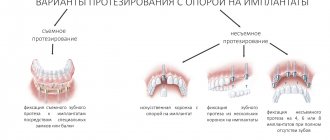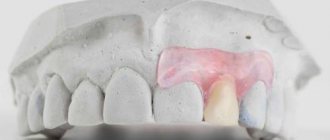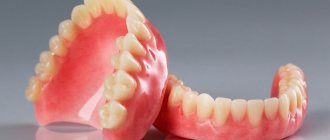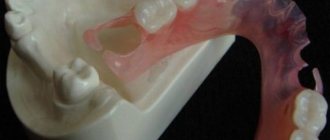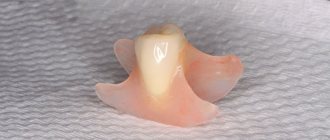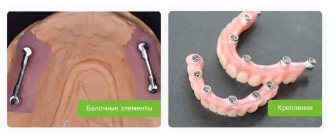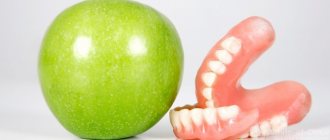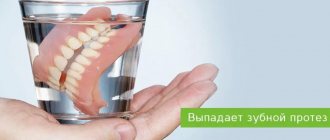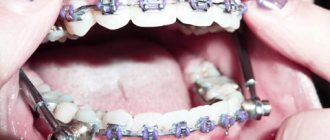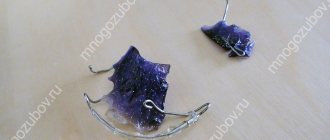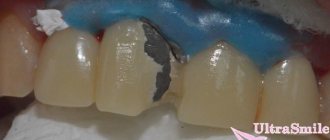Completely removable dentures are used for prosthetics of jaws that are completely devoid of teeth (in the case of edentia). The prosthesis is held on the jaw due to its tight fit to the tissues of the prosthetic bed. If we are talking about a prosthesis for the upper jaw, then high-quality fixation can be achieved through a special valve that creates negative pressure, that is, in essence, the prosthesis is held in place by vacuum. Traditionally, dentures for the lower jaw are very uncomfortable, this is due to poor conditions for their reliable fixation. Specially developed adhesive pastes and creams can help keep the prosthesis in place; they significantly improve retention (adherence) of the structure. Often, such dentures are made of acrylic plastic, with the help of special dyes, it is given the color and shade of the patient’s gums so that it does not stand out against the background of the oral cavity, and artificial teeth are mounted into it, which exactly imitate a person’s normal bite.
The process of getting used to dentures (full or partial) is often long and difficult
Thanks to such products, patients can enjoy life again, eat whatever they want (and even what they could not afford before), since chewing function is completely restored. Without the use of this type of prosthesis, you can forget about normal trips to catering establishments or family feasts, since such a person will not be able to afford anything other than yogurt or puree.
But the question arises - how to get used to dentures ? The process of getting used to removable dentures is very long and often difficult. Such prosthetics cannot be called a complete procedure, since the oral mucosa is constantly irritated, and the patient himself experiences discomfort.
What problems may arise after installing a denture?
Adaptation to a removable denture begins almost immediately after installation is completed in the dentist's office. And, according to statistics, almost every patient experiences certain difficulties that are associated with the adaptation period. Here are some of them:
- Vomiting reflex . Constant vomiting is a completely normal reaction of the body to a foreign object in the oral cavity, so there is no need to worry too much about this. But there is a category of people who take the longest to get used to dentures, or who don’t get used to them at all. The installation of products that stick to the sky is contraindicated for them. This must be taken into account when choosing a prosthetic method. Often, this problem goes away on its own. But for patients with hypersensitivity, it is better to abandon such structures altogether.
- Profuse salivation . The human body perceives the prosthesis as food, as a result of which the brain sends signals that then activate the corresponding functions, namely the secretion of saliva and gastric juice.
- Unpleasant sensations while eating . First of all, this problem affects the owners of removable dentures; the load is unevenly distributed across the jaw, in contrast to the natural chewing of food with real teeth. It takes a long time to get used to this.
- Perception of taste . You may partially lose your sense of taste, since not only the tongue (as many believe), but also the rest of the oral cavity is involved in its perception. The patient may stop feeling spicy, salty, hot or sweet foods; this process occurs differently for everyone.
- Distortion of speech . The prosthesis and its protruding parts can interfere with the tongue; a person with an installed prosthesis has difficulty pronouncing words. But after some time (about a week), diction returns to normal.
How to get rid of pain
The most common problem when putting removable structures into the oral cavity is pain that occurs as a result of the gums becoming unaccustomed to the loads of chewing. It is important to understand that pain is normal in this situation and will go away as soon as the gums get used to the stress of chewing food.
The first and most effective way to relieve spasms and pain is to use painkillers. Nonsteroidal anti-inflammatory medications usually help.
To reduce the pain threshold after installing dentures, dentists advise patients not to eat foods that are difficult to grind for the first 3-5 weeks. Removable dentures for the front teeth usually do not cause adjustment problems, since the pressure on them is minimal.
To get used to it as quickly as possible, you should perform a daily gum massage, which consists of gradually increasing pressure on the sore area of the gum with your fingers for several minutes a day.
Useful tips for those who have recently installed a prosthesis
Literally from the first days of using a prosthesis, many patients complain of pain, as well as abrasions and scratches in the oral cavity. In fact, mechanical damage should not occur, since this point was thought out at the product design stage. Perhaps you are simply wearing it incorrectly. If the problem does not resolve itself, you need to contact your dentist for further adjustments to the prosthesis.
The tips given below will not completely relieve you of difficulties during the adaptation period, but they will significantly reduce the level of negative impact and will help you get used to the prosthesis faster.
The process of chewing food causes pain, so in the first few weeks it is better to protect yourself from eating solid and tough foods: meat, nuts, cookies, etc. If even soft food is painful to chew, then at first you can cut it into small pieces. Trust your feelings, and when the pain begins to subside, gradually move on to your usual, normal diet.
Under no circumstances should you reduce the number of meals. Most patients, due to a strong fear of getting damage to the oral cavity (and they take a very long time to heal), switch to liquid foods and yoghurts. But this is not the right solution, since in order to get used to the prosthesis, a constant chewing load is needed.
Foods such as pears, apples and citrus fruits should be cut into small pieces and chewed slowly, with great effort. This allows you to reduce the degree of damage to the mucous membrane, and also gives the body all the necessary vitamins.
If you have a dry mouth or increased salivation, it is recommended to drink plenty of liquid in small sips throughout the day.
If you feel slight numbness, you can do a light massage of the gums, this will improve blood circulation and the numbness will go away in just a few minutes. In this case, you need to remove the prosthesis.
Decoctions of herbs such as sage and chamomile will help strengthen your gums and prevent irritation. It is advisable to carry out the procedure three times a day. The decoction should never be hot; liquid at room temperature is the best option.
What are the causes of cracks in prosthetic structures?
The following factors and circumstances sometimes lead to breakages and cracks of the base, fastenings or artificial crowns:
- Violation of manufacturing technology. This can happen when prosthetics are performed by specialists with insufficient experience and qualifications.
- Careless handling of the structure by the patient. You don't want your denture to fall into a sink, tile floor, or other hard surface.
- Incorrect operation. Cracks can appear if you bite nuts, crackers, or chew very hard foods.
- Injuries. If a person falls or gets hit in the face, the prosthesis can also crack.
In addition, the appearance and structure of the prosthetic structure do not always remain the same after the end of its service life. Each type of such products has its own, and when it runs out, problems may arise. In this case, it is advisable to order a new orthopedic system.
Accelerate the process of getting used to the prosthesis
- Rinse your mouth with a salt solution;
- Take the process of cleaning your denture seriously;
- Try sucking on lollipops, this process calms you down and distracts you from having a foreign object in your mouth;
- To improve your diction, say tongue twisters, read aloud, and speak more often. It’s also worth trying to pronounce words louder. Often, normal speech is restored within a few weeks;
- For a more reliable fixation of the prosthesis in the oral cavity, it is best to use special gels and ointments; they not only allow you to securely fix the product in the mouth, but also prevent the appearance of abrasion wounds and other mechanical damage to the oral cavity.
- It is necessary to completely exclude various sticky foods from the diet, and not only for the period of getting used to the prosthesis. These can be candies, various chocolate bars with nougat, toffees, etc.), they can not only cause discomfort during chewing, but also damage the structure.
Habituation depending on device type
The table shows descriptions of prostheses made from various materials and the time frame for getting used to them:
| Product type | Features of the adaptation period | Terms of adaptation |
| Plate product made of hard plastic | This option is considered outdated and causes chafing of the gums due to its hardness and thinness. The first weeks of using the structure are associated with significant discomfort. | Up to 6 months |
| Acrylic | A rarely used budget design option. The prosthesis is equipped with a soft base. Operating the product is also associated with discomfort. | Up to 2 months |
| Nylon | A soft prosthesis that is comfortable to wear and use. The main disadvantage of nylon products is rapid deterioration. | 2–4 weeks |
| Quadrotti and Acrifri | Modern systems made from innovative materials. They meet all the requirements of flexibility, elasticity and strength. | 1–2 weeks |
| Butterfly | A temporary solution to the problem of missing teeth in the oral cavity. More often used to mask a single defect. | No need to get used to it |
| Bulgelny | The design consists of a metal arc, artificial elements, and clasps. Bulk dentures are not used if there is a complete absence of teeth in a row. | 2–3 months |
What to do if the addiction is seriously delayed?
If, over a fairly long period of time, you cannot get used to the prosthesis (that is, to a foreign body in the mouth), then there may be several logical explanations for this problem:
- Jaw atrophy;
- Individual characteristics of the jaw structure of a particular patient;
- Poor fixation of the structure;
The most difficult thing to get used to is the so-called clasp structures, which are based on fastenings made of metal. In addition to mechanical effects, exposed metal parts can also have chemical effects, reacting with the acidic environment of the oral cavity. It is simply impossible to correct such a product on your own, as it is easily damaged. Therefore, if you have the feeling that such a design is rather poorly and unreliably fixed in your mouth, it is better to go to a specialist. If the mobility of the prosthesis inside the oral cavity is due to jaw atrophy, a special ointment for additional fixation can help you.
Terms of adaptation
For some, the feeling of discomfort passes quite quickly; for others, the adaptation process is inevitably associated with prolonged physical suffering.
Talking about exact dates is quite problematic, because quite a few factors play a role here. For example, the condition of the patient’s gums at the time of installation of the prosthesis. Severely damaged gums will begin to actively rub against the surface of the product, this will cause even greater irritation. In this case, the adaptation process will drag on for several months. The period of adaptation increases significantly when installing clasp dentures; this type of construction has many metal parts that easily damage the soft tissues of the oral cavity.
Psychological state is an important factor in the process of getting used to dentures. A person who experiences stress, is constantly nervous and tries to remove the prosthesis at the first opportunity, himself prolongs the adaptation period, and quite significantly.
If we talk about averages, then for most patients the adaptation period takes approximately two (2) weeks . The reasons listed above can guarantee to increase the period of adaptation to several months.
Options for getting out of the current situation
The problem is resolved on an individual basis, taking into account the client’s personal wishes and financial capabilities. Corrective methods include: relining the structure, replacing components, implanting dentures, manufacturing a more advanced structure. Magnetic fixation, adjustment or replacement of fixation mechanisms are also often used.
An important point is that after 3-5 years, even the most expensive products need replacement or adjustment. Timely replacement is the right solution for those who want to have a wonderful smile without huge financial costs.
Recommendations for use
| Click to sign up for a FREE consultation |
The service life of each product directly depends on the source materials, operating conditions and variety. Thus, the service life of an acrylic structure is about 5 years, clasp systems - up to 10 years.
An important aspect is the storage of the prosthesis. It is recommended to store rubber products in water at night, as this prevents their deformation; more modern acrylic and nylon prostheses do not need to be removed at all (if you want to take a break from the prosthesis, the structure can be removed, cleaned and placed in a special case). If you have not worn a removable denture for a long time, it should be treated with an antiseptic before installation.
The main rule for long-term use of a removable denture is regular visits to the doctor. Don't forget to visit the dentist at least once a year.
Caring for a removable denture
Proper care of the prosthesis is the key to the fastest possible adaptation. For those people who have previously carefully cared for their oral cavity and teeth, the process of caring for a denture will not become something scary and overly intrusive. You just need to learn a few simple rules:
- Rinse your mouth after every meal. It would also be a good idea to rinse the structure itself. Simply remove it from your mouth and rinse thoroughly under running water;
- Every morning, the denture must be cleaned with a brush and a special paste. Each type of prosthesis has its own accessories, which are selected separately. During the cleaning process, special attention should be paid to the inside of the prosthesis, this is where a huge number of different microorganisms accumulate, and food particles also become clogged. Otherwise, they can cause severe gum inflammation.
- Additional disinfection is still necessary. To carry it out, you will need to purchase some additional funds. In most cases, these are ointments or effervescent tablets, into the solution of which the prosthesis is dipped.
Some products for the care of dentures
Read about dental prosthetics in St. Petersburg in the article.
Moscow metro station Zvezdnaya, Danube Avenue, 23
